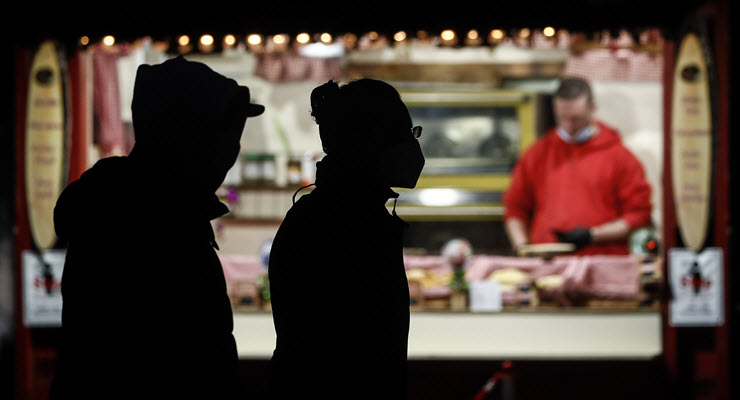
The vaccine may have arrived but the effects of coronavirus are very much still here. Many countries are grappling with second and third waves and debating whether social restrictions should be eased over Christmas.
Sweden
Sweden took a different approach to the rest of the world with voluntary restrictions and life as normal during the first wave. It should have been well set up: only two-thirds of its population live in a big city and almost half of Swedes live alone.
But voluntary restrictions had a devastating effect. Intensive care units are at 99% capacity. There were 20,931 new cases recorded yesterday. Sweden’s seven-day average of daily cases and deaths per capita is higher than the UK, France and Spain, with a death rate five times higher than Denmark and 10 times higher than Norway.
Nearly half of those deaths have been in nursing homes, with a commission finding the government hadn’t done enough to protect the elderly.
Yesterday the government implemented a national set of restrictions, limiting social gatherings ahead of Christmas. But compared with the rest of Europe, the rules are still lax — Swedes can dine in restaurants.
An Ipsos poll found that in October, 44% of Swedes said not enough was being done to deal with the pandemic.
Spain
In Spain, cases are climbing for the first time in five weeks. The 14-day cumulative number of cases per 100,000 inhabitants has risen to 193.6, up from 189 on Friday with a total 48,013 deaths recorded. There are concerns a vaccination drive set to start from January 4 could spread the virus before the vaccine has time to work.
The island of Mallorca has implemented a 10pm curfew to stay in place even over Christmas and the new year.
UK
The UK planned to ease restrictions for five days over Christmas to allow three houses to form a bubble, but the plan is facing a backlash as London and other parts of England and Wales go back into tier three lockdowns with more than 18,000 people testing positive in the past 24 hours.
Greece
In Greece, lockdown has been extended until January 7 as 1240 new cases were recorded on Tuesday — almost double Monday’s figure. Refugees and migrants on the Aegean islands have been hit particularly hard, with regional hospitals lacking medical equipment and testing supplies.
Germany
With similar daily case numbers to the UK, Germany announced a hard lockdown, reducing Christmas Day gatherings to five people from two households.
India
India has reported more cases of COVID-19 than any country other than the United States with just under 10 million and more than 143,000 deaths.
Cases surged after the government announced lockdowns in March and April, leaving many migrant workers stranded in the city with no income. The government provided “labourer trains” to get more than 6 million people back to their villages — trains which became contagion zones with infected passengers crammed together, spreading the virus to rural areas.
Japan
Japan is facing a third wave with a spike of serious cases recorded in Tokyo, and 1678 new infections recorded across the country on Monday.
A dedicated COVID-19 facility has opened in Osaka to treat seriously ill patients, with military nurses assisting hospitals. An extra ¥21.8 trillion (A$278 trillion) has been pledged to help fund pandemic support.
Most Japanese are against hosting the Tokyo Olympics in July — 32% want the games to be cancelled and 31% want them postponed.
South Africa
South Africa recorded 7552 new cases on Tuesday. New infections are highest in the 15 to 19 age group, driven by end-of-year student festivities.
Across Africa, cases have been rising since mid-November. Testing levels are low, meaning the virus is probably more widespread than numbers show.








Where’s Adam Schwab? I am waiting for his progress report on Sweden, the country whose Covid-19 policies he’s been so enthusiastically promoting. What does he have to say about this piece, which claims that “…voluntary restrictions had a devastating effect. Intensive care units are at 99% capacity. There were 20,931 new cases recorded yesterday. Sweden’s seven-day average of daily cases and deaths per capita is higher than the UK, France and Spain, with a death rate five times higher than Denmark and 10 times higher than Norway.”
It’s not often I agree with you Madonna, but well said. Research and education are the key to keeping (and improving for many) our standard of living. Politicians on all sides are only driven by the short term.
Here in Sydney we are making up for lost time. Twelve months ago, you’d see the first vomiting office-worker outside a bar around 6pm on a Friday. This year since lockdown it’s about 4:30pm. Perhaps our resilience is down. Or we’re making up for lost time.
There go the Olympics.
Interesting point Tony. Will the vaccine save them?